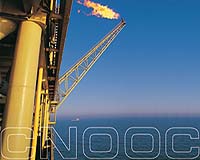 |
Baghdad (UPI) Nov 4, 2009 Baghdad's deal Tuesday with BP and the China National Petroleum Corp. to invest $15 billion in the giant Rumaila oil field to help rebuild Iraq's ramshackle oil industry gives energy-hungry China its first real grip on Middle Eastern oil. But the 20-year contract carries immense risk as another bout of sectarian savagery looms in Iraq. Still, China has demonstrated that it's prepared to gamble -- and pay top dollar -- as its companies roam the globe snapping up energy resources, particularly in West Africa. Before Wednesday's deal, Beijing had purchased an estimated $15 billion in oil and gas supplies worldwide this year alone. That's double the figure for all of 2008. In August, Sinopec, one of China's three state-owned oil giants, paid $8.9 billion to purchase the Swiss-Canadian firm Addax, which had holdings in Africa and the semiautonomous Kurdish enclave in northeastern Iraq. That should have been China's access to Iraq's oil riches, but because the regional government in Kurdistan had signed separate deals with foreign oil companies with Baghdad's approval, Sinopec's acquisition meant it joined the federal government's blacklist of companies working with the Kurds. The Iraqi Oil Ministry will hold its second oil auction in December, and other Chinese companies may be bidding for other oil fields then. China is also a major purchaser of Iranian oil, in defiance of U.S.-led sanctions, and recently signed a major deal to develop the giant South Pars gas field in the Persian Gulf. Whether the Chinese will pursue new oil sources in other parts of the Middle East is not clear. The Arab oil fields, apart from those in Iraq, are all nationalized, and their governments have shunned foreign participation. Iraq is only throwing open its doors because it needs foreign investment -- as much as $100 billion by some estimates -- to refurbish its long-neglected oil industry and boost production to fund reconstruction. But Saudi Arabia and other Gulf producers are now looking to China as their main export market. "Very oil-rich countries, particularly in the Middle East, see China and East Asia as becoming the major demand center, and therefore they want to build diplomatic and commercial links with future major customers," says Philip Andrews-Speed, an energy expert at Dundee University in Scotland. China's expanding economy has allowed it to take advantage of low prices caused by the global meltdown to scoop up energy deals. "They're cash-rich, which is why they can offer better terms to the host country or company," according to Wu Kang, an energy specialist with the East-West Center in Hawaii. The Chinese also offer infrastructure investments that poor countries find attractive. China is also prepared to deal with non-democratic regimes with unsavory reputations. For instance, the China International Fund is negotiating a major deal, purportedly worth as much as $7 billion, with the much-criticized military-backed government of Guinea in West Africa to prospect for oil and minerals in exchange for major infrastructure and minerals projects. These include power generation and starting an airline. That has triggered accusations that Beijing will be throwing an economic lifeline to a regime that slaughtered 150 opposition protesters several weeks ago and now faces international sanctions. In some cases, governments see China as a political counterweight to the United States and believe that the geostrategic pendulum is now swinging Beijing's way. The China National Offshore Oil Corp., another of China's three majors, is negotiating with Nigeria's government on another blockbuster purchase of some of the planet's richest oil blocs. It wants to buy licenses held by major Western oil companies such as Chevron, Shell, Total and Exxon Mobil when their leases run out. These hold 6 billion barrels of oil, equivalent to one in every six barrels of Nigeria's proven reserves. The value of the Chinese offer has not been official disclosed, but industry insiders say it's as much as $30 billion. China's willingness to make deals with corrupt and disreputable regimes, in stark contrast to the human-rights focus of the Europeans, and even to provide them with arms, could backfire on the Chinese, industry analysts say. "China's scramble for resources betrays a lack of confidence that global commodity markets can provide the fuel for its industrial development," The Financial Times noted recently. "Locking in specific sources of oil may give China a sense of supply security, but in the long term it leaves it open to the vagaries of oil suppliers' politics." Share This Article With Planet Earth
Related Links Powering The World in the 21st Century at Energy-Daily.com
 Chinese giant to buy US oil assets: company
Chinese giant to buy US oil assets: companyOslo (AFP) Nov 4, 2009 Norwegian energy group Statoil said Wednesday it was selling some of its US offshore oil assets to China's state-owned CNOOC, marking the first step by a Chinese energy major into the US market. The sale, announced along with Statoil's quarterly results, involves a limited stake for the China National Offshore Oil Corporation (CNOOC) in four exploitation licences for deepwater blocks bought ... read more |
|
| The content herein, unless otherwise known to be public domain, are Copyright 1995-2009 - SpaceDaily. AFP and UPI Wire Stories are copyright Agence France-Presse and United Press International. ESA Portal Reports are copyright European Space Agency. All NASA sourced material is public domain. Additional copyrights may apply in whole or part to other bona fide parties. Advertising does not imply endorsement,agreement or approval of any opinions, statements or information provided by SpaceDaily on any Web page published or hosted by SpaceDaily. Privacy Statement |